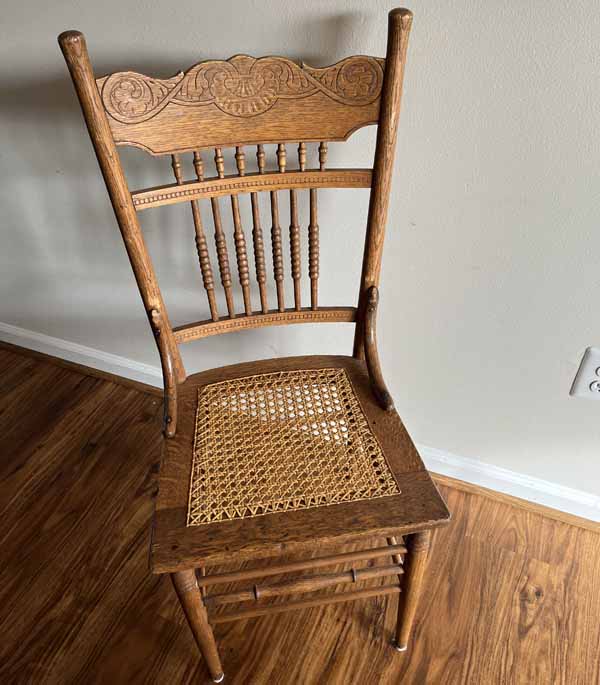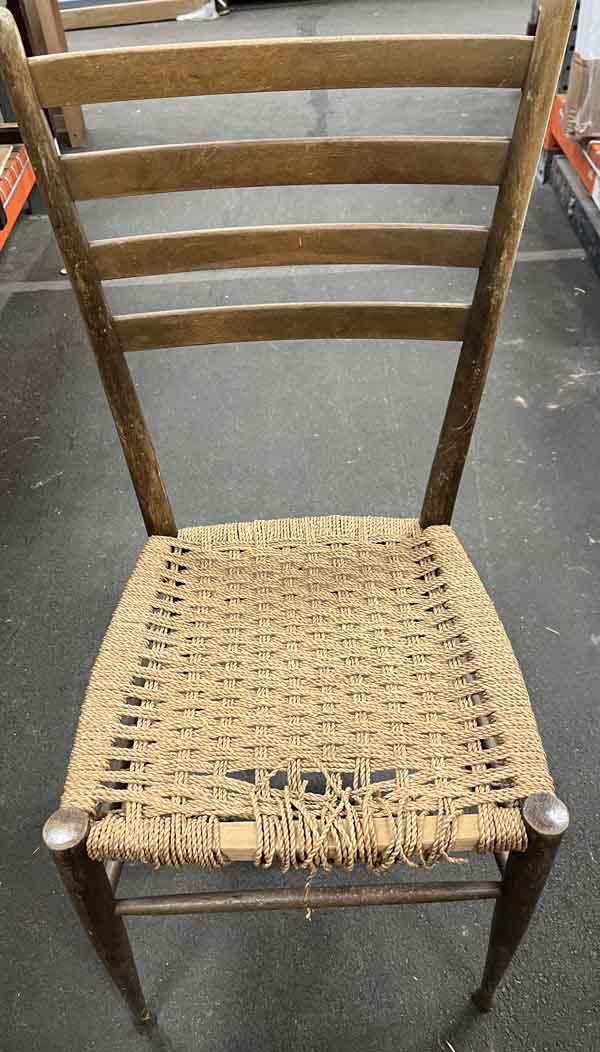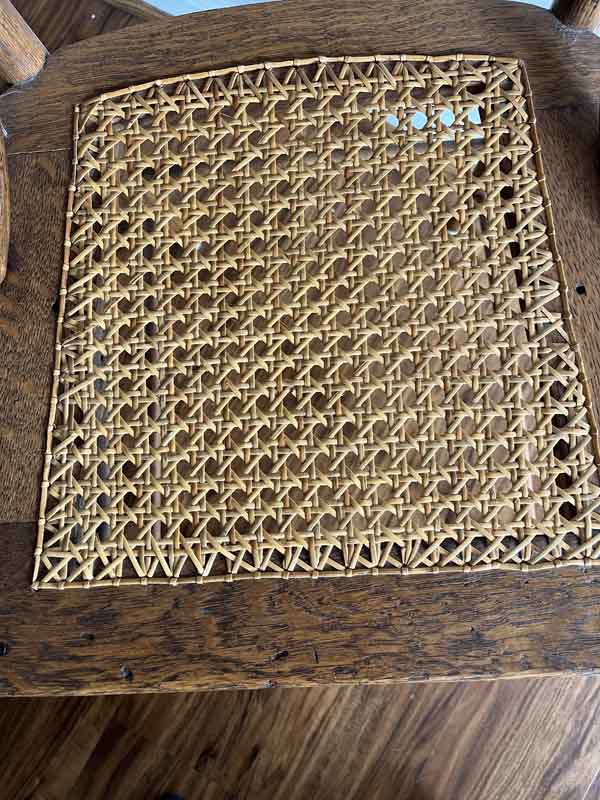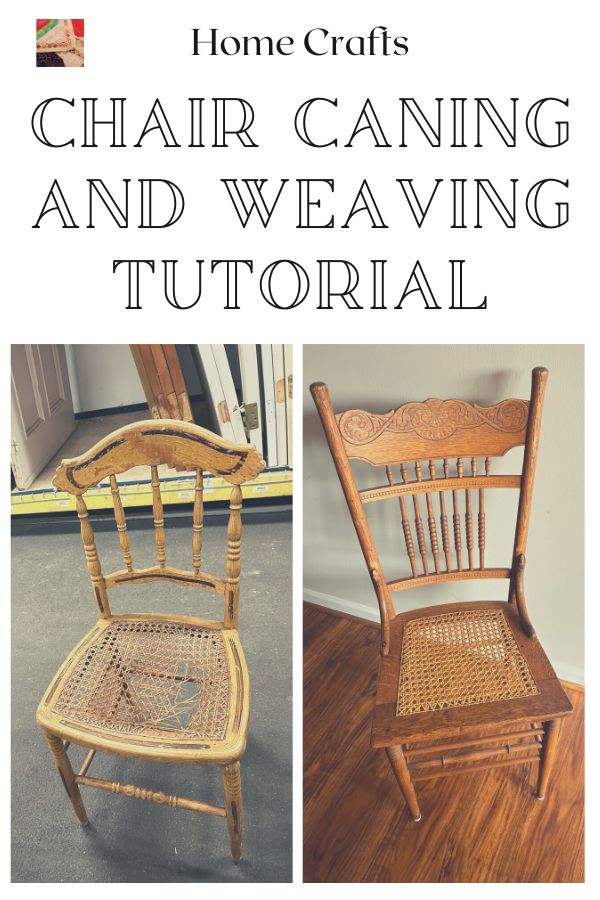Ah, chair caning! This was on my teenage bucket list and something I learned from my grandfather when I was in high school. Chair weaving looked so very difficult, but I found it meditative, and calming in fact.
I purchased several antique chairs with the holes so I knew they were to be hole-to-hole caned, learned how to strip and refinish them from a friend, and would then use my grandfather’s chair caning instructions to weave beautiful seats for my antique chairs.
Chair caning supplies can be easily purchased, but I was lucky to have an excited grandfather who purchased all of my supplies.
History of Chair Caning
Weaving and caning the seats of chairs is an ancient art. It has been an art for centuries!
A daybed woven in a similar fashion to what we see today was found in King Tutankhamun’s tomb, and the daybed is dated back to 1300 BC.
Although chair caning was an art in many parts of Europe and in the Eastern area of the world in the 1600s, it became most popular in the 1700s through the1900s.
The materials and methods used today for chair caning and chair weaving have not changed much since that time period. Learn more about chair caning supplies and scroll down for chair caning how to tutorials!
What material is used to cane chairs?
There are several materials used in chair caning.
- Chair cane
- Rattan reed
- Hand-twisted natural bulrush
- Cattail leaves
Cane and rattan are from the same plant that grows in the rainforest, called the rattan palm. The thorns on the rattan pole are removed and shiny bark is what is known as chair cane.
Because the bark used for cane is glossy and smooth, it does not take paint or stain well.
After the glossy bark is removed, a porous and pithy inner part of the rattan palm is left. It is what is known as reed. Since reed is porous, it can be painted or stained, unlike the cane.
Cattail leaves can also be harvested and used to cane or weave and are easily found near ponds. Bulrush leaves are also harvested and make for excellent chair caning, but it is difficult to find. It grows near streams and is much more difficult to harvest than cattail leaves.
Bulrush, preferred over cattail leaves for chair chaining, is hand-twisted into a roping that is used. Because it is hard to find, takes a lot of work to hand-twist, and is an advanced weaving process, it is becoming a dying art.
These materials are often used in basket weaving as well.
What are the three types of chair caning?
The most common is the traditional hole-to-hole hand caning, which is the chair caning technique that I learned. There are many steps to this artful caning and the finished seat has small octagon patterns all over it.
Some chairs have grooves instead of holes. For this, a pre-woven sheet of cane is cut and inserted into the groove and then secured with glue and a reed spline. This is called cane webbing. No weaving is necessary for this technique.
The third technique for chair caning is when very wide strips of cane are woven around the seat dowels of chairs or stools. Like the hole-to-hole caning, it is much more labor intensive than the cane webbing. This form of chair caning is called wide binding.
Scroll down the page to find video and written chair caning instructions, history of chair caning, popular chair caning styles, and even instructions on how to care for caned weaving.
We hope you enjoy the many links to chair caning topics. Try your hand at this art. It is not difficult after a little bit of practice and makes for a beautiful finished piece of furniture of which to be proud.

Supporting Products and links: Some of the links below may be affiliate links.
We make a small commission on sales through the affiliate links, at no extra cost to you. Thank you in advance
for your purchase and your support! Please see our full Affiliate
Statement for more information.
|
In this blog, you'll look at popular styles, prepare the cane to use, maintain your cane chair, materials needed, and other seat options.
Van Dyke's Restorers
|
|
|
What are the differences between chair cane and rattan reed and how are they used in the construction of wicker furniture and basketry.
Wicker Woman
|
|
|
Tips on the care and maintenance of your cane furniture.
The Wicker Woman
|
|
|
Use these simple directions to show you how to easily remove chair cane webbing.
Wicker Woman
|
|
|
|
|
On-line catalog of supplies for chair caning, wicker repair, basketry and more.
Frank's Cane and Rush Supply
|
|
|
Here’s an article and a video that takes you step-by-step on your journey to gathering cattail leaves for seat weaving or basket making projects.
Wicker Woman
|
|
|
Follow these steps to prepare and process cattail leaves for weaving chair seats and baskets.
Wicker Woman
|
|
|
Here is a video on how to cane a chair with cattails.
NancyToday on YouTube
|
|
|
|
|
Learn a little bit about the history of Chair Caning, the art and craft of this weaving technique and even how to identify and repair.
The Wicker Woman
|
|
|
A seven step method for chair caning along with advanced caning patterns.
Chair Caning
|
|
|
A video of how to cane a chair - traditional method.
Wickerguru on YouTube
|
|
|
Wickerguru continues the tutorial on how to cane a chair.
Wickerguru on YouTube
|
|
|
|
|
Check out this video if you want to learn how to weave flat wide binding cane in the Herringbone pattern in a chair seat.
YouTube
|
|
|
Learn how to weave a chair seat with flat reed in a herringbone pattern.
Mother Earth News
|
|
|
This article is from choosing chair, to drilling holes to weaving.
WikiHow
|
|
|
Step-by-step instructions for how to install can webbing to repair a chair.
Wicker Woman
|
|
|
|
|
This handy wicker furniture painting article answers the questions most often asked about How-to Paint Wicker Furniture.
Wicker Woman
|
|
|
What Is Paper Rush, Paper Wicker, Paper Rope?
The Wicker Woman
|
|
|
Instructions on how to install pre-woven cane into the groove of a chair.
Basket Makers Supply
|
|
|
A video is using the pre-woven rattan method to repair a chair seat. Easy step-by-step instructions.
Wickerguru on You Tube
|
|
|
|
|
This part 2 video continues the pre-woven rattan method to repair a chair seat. Easy step-by-step instructions.
Wickerguru on You Tube
|
|
|
This beginner DIY blogger is going to show you two ways – the Easy and Stubborn Spline Methods – to remove pressed cane from a chair!
Everyday Old House
|
|
|
A video on how to install a press cane seat.
You Tube
|
|
|
To rush a chair the strands of rush are stretched across the seat and looped around the rails, moving in a counterclockwise direction, to fill in the seat. Learn this seatweaving technique.
WikiHow
|
|
|
|
|
Video instructions on how to weave a rush seat in a ladder-back chair using fiber rush.
Peerless Rattan Supplies on YouTube
|
|
|
Learn how to rush that chair seat with these how-to instructions.
Wicker Woman
|
|
|
In this video learn how to weave a chair with paper fiber rush along learn tips and tricks for making your rush chairs look professional and not just suitable. Great for all levels of weavers.
Silver River Chairs on YouTube
|
|
|
Pictures and information on the different types of seat weaving - hand caning, cane webbing, splint, rushes and more.
The Wicker Woman
|
|
|
|
|
Basic overview of a variety of seat weaving techniques including chair caning, rush, splint, Danish cord and more!
Wicker Woman
|
|
|
This blog has instructions for repairing a chair with shaker tape weaving.
Shaker Workshops
|
|
|
Online Step-By-Step Shaker Tape Weaving Instructions for chairs, rockers or stools.
Basket Makers Supply
|
|
|
From beginning to end learn how to weave Shaker tape seats.
Fine Woodworking
|
|
|
|
|
How-to article showing and describing the variety of woven chair seats, from different designs and patterns to materials used for weaving.
The Wicker Woman
|
|
|
Learn how to weave a chair set with hickory bark.
Basket Maker's Supply
|
|
|
Hickory bark, a traditional chair seating material, is beautiful and long-lasting. Learn how to weave a chair set with hickory bark.
Basket Makers Supply
|
|
|
Learn to weave a chair seat with this tutorial.
Using flat reed is an inexpensive and strong chair seat and will last for years.
Basket Makers Supply
|
|